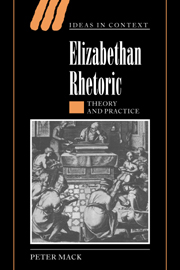Book contents
- Frontmatter
- Contents
- Acknowledgements
- Introduction
- 1 Rhetoric in the grammar school
- 2 Rhetoric and dialectic at Oxford and Cambridge
- 3 English-language manuals of rhetoric and dialectic
- 4 Everyday writing: notebooks, letters, narratives
- 5 Histories, conduct manuals, romances
- 6 Political argument
- 7 Elizabethan parliamentary oratory
- 8 Religious discourse
- Conclusion
- Bibliography
- Index of rhetorical and dialectical terms
- General index
- IDEAS IN CONTEXT
2 - Rhetoric and dialectic at Oxford and Cambridge
Published online by Cambridge University Press: 22 September 2009
- Frontmatter
- Contents
- Acknowledgements
- Introduction
- 1 Rhetoric in the grammar school
- 2 Rhetoric and dialectic at Oxford and Cambridge
- 3 English-language manuals of rhetoric and dialectic
- 4 Everyday writing: notebooks, letters, narratives
- 5 Histories, conduct manuals, romances
- 6 Political argument
- 7 Elizabethan parliamentary oratory
- 8 Religious discourse
- Conclusion
- Bibliography
- Index of rhetorical and dialectical terms
- General index
- IDEAS IN CONTEXT
Summary
Sixteenth-century England's two universities were of crucial importance in national life. One reason for this was the relatively high age-participation rate. By the last decades of the sixteenth century about 700 pupils annually (or just over one per cent of the male cohort) entered Oxford. They were drawn from the same social groups as those who attended grammar school: sons of prosperous husbandmen and yeomen, burgesses from the towns, country gentry, professional men and the lower ranks of the titled. At Oxford and Cambridge the future élite of the country were educated and became acquainted. University graduates went on to become priests, country gentlemen, school teachers, academics, royal servants, doctors, lawyers and tradesmen, as McConica's study of the records of Corpus Christi College, Oxford (which may not have been representative) indicates. The majority of the writers whose works are discussed in the later chapters of this book were members of the minority of the population who attended Oxford or Cambridge.
The Queen and her councillors took a personal interest in university affairs. Three times in her reign Elizabeth made a formal visitation of one of her universities. Each visitation lasted almost a week and necessitated the transfer of the machinery of government and the highest officers of state to Oxford or Cambridge. Elizabeth and her courtiers took care to be well-informed about what was going on in the universities. This was a consequence of the prestige of learning. Humanist theorists and their admirers who founded schools required educated school-teachers.
- Type
- Chapter
- Information
- Elizabethan RhetoricTheory and Practice, pp. 48 - 75Publisher: Cambridge University PressPrint publication year: 2002



